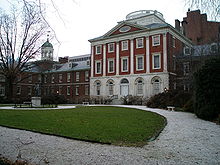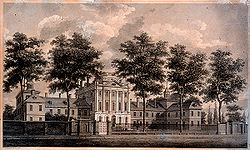This Week in History:
January 15 - 21, 1780
Benjamin Franklin Not Getting Any Older
January 2012
 Benjamin Franklin (1706-90)—philosopher, scientist, inventor, printer, musician, economist, and statesman. |
Although we celebrate Benjamin Franklin's 306th birthday on Jan. 17, he may not be quite so old as we think. He has had a lot of time to go in the opposite direction, as he demonstrates in his letter to Dr. Thomas Bond in 1780: "For my own part, I do not find that I grow any older. Being arrived at seventy, and considering that by traveling further in the same road I should probably be led to the grave, I stopped short, turned about, and walked back again; which having done these four years, you may now call me sixty-six. Advise those old friends of ours to follow my example; keep up your spirits, and that will keep up your bodies; you will no more stoop under the weight of age, than if you had swallowed a hand-spike."
Franklin and the recipient of the above letter had been friends from at least 1751, when they collaborated on an important infrastructure project—building a Pennsylvania hospital where the poor would receive excellent medical care. Dr. Bond had conceived of the idea for a hospital serving both Philadelphia and the growing agricultural counties to the west. But when he attempted to raise funds, everyone asked him if he had asked for Ben Franklin's advice. When he answered "no," they said they would think about it. So, Dr. Bond went to Franklin and enlisted his help.
In his Autobiography, Franklin says that he "engag'd heartily in the Design of Procuring Subscriptions from others. Previous however to the Solicitation, I endeavoured to prepare the Minds of the People by writing on the Subject in the Newspapers, which was my usual custom in such Cases, but which he [Bond] had omitted." Donations at first were generous, but when they began to flag, Franklin realized the hospital would also need help from the Pennsylvania Assembly. When he introduced a bill, members from outside Philadelphia objected on the grounds that it would only serve the city, and said that they doubted that the citizens themselves actually approved of the project. Franklin responded that, on the contrary, the citizens approved so heartily that they would gladly contribute 2,000 pounds.
|
Pennsylvania Hospital in Philadelphia, 2007 |
Pennsylvania Hospital in Philadelphia, 1755, by William Strickland |
The legislators considered this statement a most extravagant claim, and utterly impossible, and this is where Franklin had them in his snare. He brought in a new bill which stipulated that if a capital stock of 2,000 pounds were raised, then the Assembly would match it with 2,000 pounds paid over two years. Said Franklin, "This Condition carried the Bill through; for the Members who had oppos'd the Grant, and now conceiv'd they might have the Credit of being charitable without the Expence, agreed to its Passage; and then in soliciting Subscriptions among the People we urg'd the conditional Promise of the Law as an additional Motive to give, since every Man's Donation would be doubled. Thus the Clause work'd both ways."
The required sum was raised very quickly, the money from the Assembly followed, and "a convenient and handsome Building was soon erected, the Institution has by constant Experience been found useful, and flourishes to this Day." But in this day of shrinking medical facilities, mismanaged care, and the security threat to even our nation's capital from the closing of its high-level trauma center, D.C. General Hospital, it is useful to look at Franklin's 1751 articles in "The Pennsylvania Gazette" which laid out the reasons for founding a hospital, especially one which would serve the poor.
"But the Good particular Men may do separately, in relieving the Sick, is small, compared with what they may do collectively or by a joint Endeavour and Interest. Hence the Erecting of Hospitals or Infirmaries by Subscription, for the Reception, Entertainment, and Cure of the Sick Poor, has been found by Experience exceedingly beneficial, as they turn out annually great Numbers of Patients perfectly cured, who might otherwise been lost to their Families, and to Society. Hence Infirmaries spread more and more in Europe, new Ones being continually erected in large Cities and populous Towns where generally the most skilful Physicians and Surgeons inhabit. And the Subscribers have had the Satisfaction in a few Years of seeing the Good they proposed to do, become much more extensive than was at first expected; for the Multitude and Variety of Cases continually treated in those Infirmaries, not only render the Physicians and Surgeons who attend them, still more expert and skilful, for the Benefit of others, but afford such speedy and effectual Instruction to the young Students of both Professions, who come from different and remote Parts of the Country for Improvement, that they return with a more ample Stock of Knowledge in their Art, and become Blessings to the Neighbourhoods in which they fix their Residence....
"But the Difference with Regard to the unhappy Sufferer is still greater. In an Hospital his Case will be treated according to the best Rules of Art, by Men of Experience and known Abilities in their Profession. His Lodgings will be commodious, clean and neat, in an healthy and open Situation, his Diet will be well chosen, and properly administred: He will have many other necessary Conveniencies for his Relief, such as hot and cold Baths, sweating Rooms, chirurgic Machines, Bandage, &c. which can rarely be procured in the best private Lodgings, much less in those miserable loathsome Holes, which are the common Receptacles of the diseas'd Poor that are brought to this City.-In short a Beggar in a well regulated Hospital, stands an equal Chance with a Prince in his Palace, for a comfortable Subsistence, and an expeditious and effectual Cure of his Diseases."
"It is hoped therefore, that whoever will maturely consider the inestimable Blessings that are connected to a proper Execution of the present Hospital Scheme in this City, can never be so void of Humanity and the essential Duties of Religion, as to turn a deaf Ear to the numberless Cries of the Poor and Needy, and refuse for their Assistance, a little of that Superfluity, which a bountiful Providence has too liberally bestowed on them."
Happy Birthday, Benjamin Franklin!
The original article was published in the EIR Online’s Electronic Intelligence Weekly, as part of an ongoing series on history, with a special emphasis on American history. We are reprinting and updating these articles now to assist our readers in understanding of the American System of Economy.


